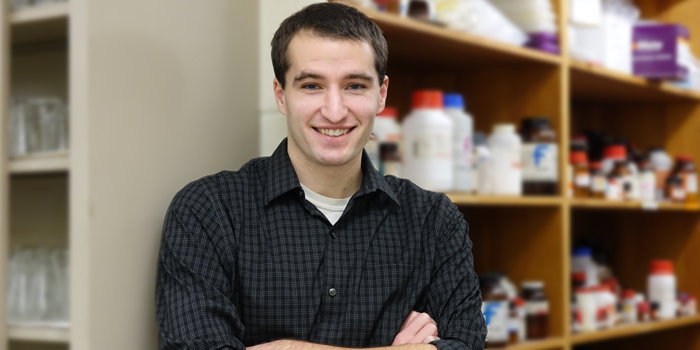James Christenson chosen to present at national enzyme mechanisms conference.

James Christenson, a graduate student in the Department of Biochemistry, Molecular Biology, and Biophysics, was the sole recipient of the Enzyme Mechanisms Conference Founder’s Travel Award. The award covered the cost for Christenson to attend the conference, held in St. Pete Beach in Florida earlier this month where he presented an enzyme mechanism essential to the synthesis of a beta-lactone.
“Christenson was singly chosen to receive the award by the U.S. enzyme mechanism research community. There is only one award given each year to a graduate student or postdoc,” says Distinguished McKnight University Professor Larry Wackett. Christenson is advised by Wackett and Professor Carrie Wilmot. The conference organizers chose Christenson’s abstract for the award from among the poster submissions.
Christenson sought to understand the mechanism of olefin biosynthesis for applications in the renewable production of specialty chemicals, like those used in cosmetics, currently made from crude oil. In the process he made an unexpected discovery—an enzyme mechanism, previously unknown in nature, responsible for the synthesis of a beta-lactone. This molecular building block is present in many natural products and possible drug compounds. In fact, it is also part of a multimillion-dollar drug called Orlistat, the only FDA-approved drug to treat obesity.
Wackett commented on the findings’ significance. “The major antibiotics are becoming ineffective due to bacterial resistance,” he said, “Christenson’s discovery of the mechanism to make beta-lactone drugs opens the door for research into a whole new family of antibiotics and other drugs to help fight disease.” The paper on the mechanism, published by the ACS journal Biochemistry, is available online.
Christenson said that as a result of the funding he received as part of a NIH BioTechnology Training Grant, he was able to join Larry Wackett’s lab and pursue the research. MnDRIVE has also supported Christenson’s work. He said he looks forward to sharing his enthusiasm for biochemistry at the conference and in future teaching. “One of the things I love about biochemistry is how wonderfully connected everything is,” he said, “there are so many puzzle pieces and what I'm doing, is filling in puzzle pieces.” Christenson plans to graduate with his Ph.D. this summer and is looking for teaching or industry positions. – Deirdre Manion-Fischer